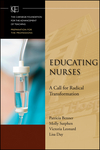Educating Nurses: A Call for Radical Transformation
 Educating Nurses: A Call for Radical TransformationISBN: 978-0-470-45796-2
Hardcover
288 pages
December 2009, Jossey-Bass
|
|||||||
Educating Nurses: A Call for Radical Transformation
The shortage of well-educated nurses has been part of the nation’s health care conversation, with policy leaders as well as President Obama noting the essential role nurses play in ensuring patient safety. The President called them “the bedrock” of health care. Now, The Carnegie Foundation for the Advancement of Teaching is calling for changes in how we educate nurses, referring both to the current nursing shortage and that nurses are ill-prepared for the profound changes in science, technology and the nature and settings of nursing practice. Informed by the results of three national surveys and extended site visits during a multi-year study, the authors of Educating Nurses: A Call for Radical Transformation recommend essential changes in policy, curriculum and in the way nursing programs approach student learning.
“We believe that the enormous pressures on today’s nursing profession—the chaotic U.S. health care system and the economic forces that drive it, shortage in the ranks of nurses, shortage of nursing educators, multiple pathways to the profession that discourage rather than encourage practicing nurses to complete post licensure degrees—threaten to compromise nurses’ ability to practice state-of-the-art nursing and enact the profession’s core values of care and responsibility,” the authors write.
Among the recommendations are:
- that the baccalaureate degree in nursing should be the minimal educational level for entry into practice and that within ten years after graduation that all nurses complete a master’s degree in nursing
- that nursing program capacities have to be expanded so that students can complete nursing programs in a reasonable amount of time and that the associate of nursing degree from community colleges be re-evaluated in light of the extended amount of time most student nurses spend in completing these nursing programs
- that coursework be tied to what actually happens in patient care rather than in the abstract, helping students make the connection between acquiring and using knowledge, integrating the classroom with clinical practice
- that nurses are prepared for the myriad contexts in which they will work, not merely a hospital setting.
“Redesigning nursing education is an urgent societal agenda," the authors write. "The profound changes in nursing practice and health care call for equally profound changes in the education of nurses and the preparation of nurse educators. Unfortunately, the current climate rewards short-term focus and cost-savings over the quality of nursing education and patient care.”




